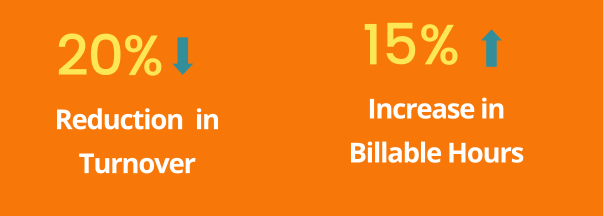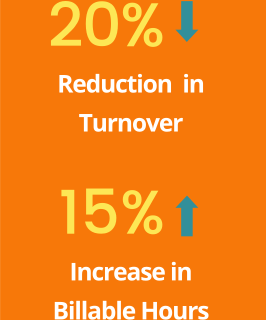Work Allocation
Effective work allocation is the cornerstone of a productive and profitable law firm. It ensures the right work reaches the right attorneys at the right time, maximizing efficiency, developing talent, and enhancing client satisfaction. Yet, many firms rely on outdated or ad-hoc systems that lead to uneven workloads, missed deadlines, and untapped potential, resulting in profit leaks and significant turnover.
At SPTC, we help firms implement strategic work allocation systems that drive efficiency, profitability, and attorney satisfaction.








The Challenge
The traditional work allocation methods utilized at law firms often results in:
Uneven workloads: Some attorneys are overloaded while others are underutilized, leading to burnout, decreased morale, and potential attrition.
Inefficient use of resources: Tasks may be assigned to attorneys with higher billing rates when a less experienced lawyer could handle them effectively, leading to inflated client costs and reduced profitability.
Missed deadlines and client dissatisfaction: Poorly managed workloads can result in missed deadlines, impacting client relationships and firm reputation.
Lack of transparency and accountability: Informal allocation processes can create ambiguity and frustration, hindering professional development and career progression.
Profit Leakage: Inefficient work allocation leads to overstaffing, write-offs, and missed revenue opportunities, directly impacting the firm's bottom line.
The Solution
SPTC offers comprehensive consulting services to optimize work allocation systems, leveraging technology and data-driven insights to improve efficiency and profitability. We provide:
Work Allocation System Assessment: We analyze your current system, identify pain points, and recommend improvements, considering expertise, capacity, and developmental goals.
System Design and Implementation: We help you design and implement the optimal work allocation model for your firm, whether it's centralized, free market, work allocation broker, or a hybrid approach.
Technology Integration: We assist in developing custom technology tools or dashboards to support data-driven decision-making or guide the selection and implementation of third-party vendor solutions.
Training and Adoption: We provide comprehensive training and support to ensure smooth adoption of new systems and processes.
Data Analysis and Reporting: We leverage data analytics to track key metrics, identify trends, and measure the impact of work allocation strategies on productivity, profitability, and attorney satisfaction.
Why Work Allocation Matters to
Law Firms
Work Allocation is a significant and persistent problem in law firms. It manifests in various ways:
Talent Retention and Development:
Attracting and Keeping Top Talent: Attorneys want challenging and meaningful work that aligns with their interests and career goals. Effective work allocation demonstrates a firm's commitment to providing growth opportunities and enhancing attorney satisfaction and loyalty.
Skill Development and Career Progression: Equitable work distribution ensures that all attorneys gain exposure to diverse practice areas and develop the necessary skills to progress in their careers. This fosters a sense of fairness and promotes internal advancement.
Operational Efficiency and Profitability:
Maximizing Productivity: Optimal work allocation ensures that every lawyer works at full capacity, maximizing the firm's billable hours and revenue generation.
Resource Optimization: Matching the right attorney with the right task based on their skills and experience leads to efficient project completion and minimizes the risk of errors or delays.
Cost Control: Inefficient work allocation can lead to overstaffing, unnecessary overtime, and missed deadlines, all of which impact profitability. Proper allocation helps firms control costs and maintain healthy profit margins.
Client Satisfaction:
Delivering High-Quality Service: Clients receive the best service when work is assigned to attorneys with the relevant skills and bandwidth. This builds trust and strengthens client relationships.
Meeting Deadlines and Expectations: Efficient work allocation ensures that projects are staffed appropriately and deadlines are met, enhancing client satisfaction and encouraging repeat business.
Diversity, Equity, and Inclusion (DEI):
Promoting Equal Opportunities: Fair and transparent work allocation processes help ensure that all attorneys, regardless of their background, have equal access to challenging assignments and opportunities for growth. This fosters a more diverse and inclusive workplace.
Addressing Unconscious & Confirmation Bias: Data-driven work allocation mitigates the impact of unconscious bias in the assignment process, promoting a more equitable environment.
Risk Management:
Mitigating Burnout and Attrition: Overworked associates are more likely to experience burnout, leading to decreased productivity, increased errors, and, ultimately, attrition. Balanced work allocation promotes mental well-being and reduces the risk of losing valuable talent.
Ensuring Ethical Compliance: Proper work allocation helps identify and manage conflicts of interest appropriately, protecting the firm from ethical violations and reputational damage.
Work allocation isn't just an administrative task; it's a strategic imperative for law firms. By prioritizing effective work allocation, firms can enhance talent retention, boost profitability, improve client satisfaction, promote DEI, and mitigate risks. In today's competitive legal market, firms that optimize their work allocation processes will have a significant advantage in attracting and retaining top talent, serving clients effectively, and achieving long-term success.
Why Work Allocation is a Problem in Law Firms and How it Manifests
Addressing work allocation issues is crucial for law firms to create a more fair, productive, and inclusive work environment, leading to improved attorney satisfaction, retention, and overall firm success.
Work allocation is a significant and persistent problem in law firms. Here are some key highlights:
Work may be disproportionately assigned based on personal relationships, proximity, or perceived favoritism rather than objective criteria like skills, experience, or capacity. This can lead to attorneys being overutilized while others are underutilized.
Associates often lack visibility into available work, making it difficult to proactively seek opportunities aligned with their interests and career goals. This can lead to frustration, disengagement, and attrition.
Unconscious/Confirmation bias can influence work allocation, resulting in certain groups receiving less desirable or challenging assignments. This perpetuates inequities and hinders diversity, equity, and inclusion efforts.
Overburdened attorneys face increased stress, burnout, and decreased job satisfaction, contributing to high attrition rates. Underutilized associates may feel undervalued and lack development opportunities, leading to turnover.
Ineffective work allocation can lead to delays, missed deadlines, and suboptimal client service. It can also hinder associate development and negatively impact the firm's bottom line.
Entrenched practices and power dynamics within law firms can make implementing new, more equitable work allocation systems challenging, requiring careful change management strategies.


By partnering with SPTC, your firm will unlock the full potential of your attorneys, improve operational efficiency, and drive sustainable growth.
Contact SPTC today to schedule a consultation and discuss how we can help you optimize your work allocation system and achieve peak performance.
Why SPTC?
Optimizing your work allocation model is crucial for maximizing firm performance and profitability.
SPTC provides the expertise and support to:


Strengthen Client Relationships: Improve responsiveness and deliver high-quality legal services on time and within budget.
Drive Data-Driven Decision Making: Leverage data analytics to continuously improve work allocation strategies and firm performance.
Increase Productivity: Ensure that attorneys work at their full potential and maximize billable hours.
Improve Profitability: Reduce write-offs, optimize staffing, and minimize profit leakage.
Enhance Attorney Satisfaction: Create a fair and transparent system that promotes work-life balance and career development.

Case Study
Optimizing Attorney Work Allocation with Data-Driven Insights:
The Challenge:
An AM Law 100 firm was facing challenges with work allocation, leading to uneven workloads, missed deadlines, and associate burnout. The existing process was primarily "free market" and relied heavily on manual processes and partner preferences, resulting in inefficiencies, bias, and uneven workloads across class years.
10+
Years of Expert Guidance


Change Management Approach
SPTC's Solution:
Implementing a centralized work allocation system that tracked attorney availability, skills, and experience.
Developing clear, sustainable guidelines and criteria for assigning work, ensuring fairness and transparency.
Providing training to partners and associates on the new systern and best practices for work allocation.



The Result
Our data-driven approach improved efficiency, reduced burnout, and ensured that work was allocated equitably and strategically.




SPTC conducts a throrough needs/gap analysis to and utilizes to recommend the best work allocation model and employs a change management approach to ensure adoption and seamless integration. We are your partners and trusted advisors throughout the entire engagement and beyond.

SPTC Case Studies
Optimizing Attorney Work Allocation with Data-Driven Insights:
The Challenge:
Implementing a centralized work allocation system that tracked attorney availability, skills, and experience.


SPTC's Solution:
An AM Law 100 firm was facing challenges with work allocation, leading to uneven workloads, missed deadlines, and associate burnout. The existing process was primarily "free market" and relied heavily on manual processes and partner preferences, resulting in inefficiencies, bias, and uneven workloads across class years.

Developing clear, sustainable guidelines and criteria for assigning work, ensuring fairness and transparency.

Providing training to partners and associates on the new systern and best practices for work allocation.

The Result
Our data-driven approach improved efficiency, reduced burnout, and ensured that work was allocated equitably and strategically.
10+
Years of Expert Guidance
Years of Expert Guidance




SPTC conducts a throrough needs/gap analysis to and utilizes to recommend the best work allocation model and employs a change management approach to ensure adoption and seamless integration.
We are your partners and trusted advisors throughout the entire engagement and beyond.
Start The Shift
Solutions
Expertise
info@shiftedparatalent.com
1-877-577-0766
© 2024. All rights reserved.
Contact
By: Sequence PR
